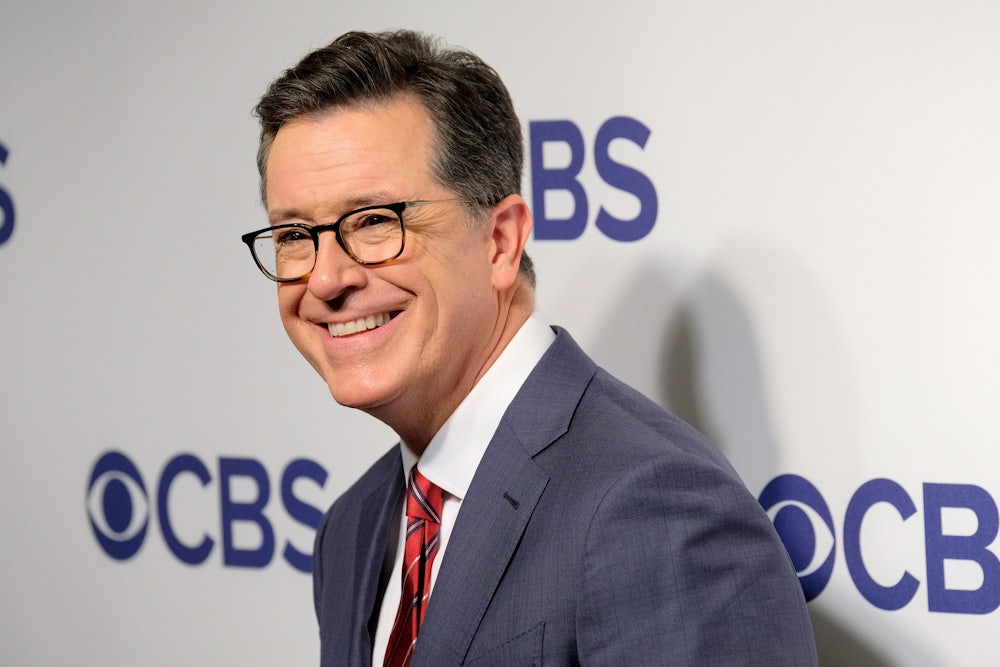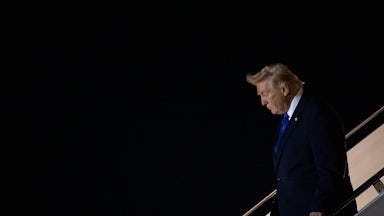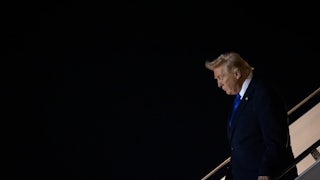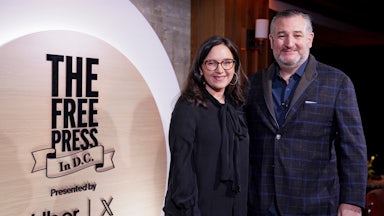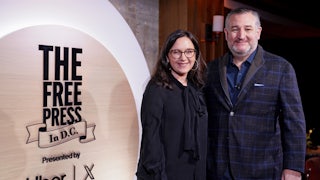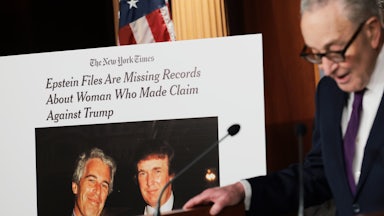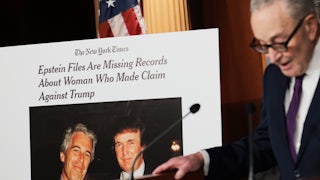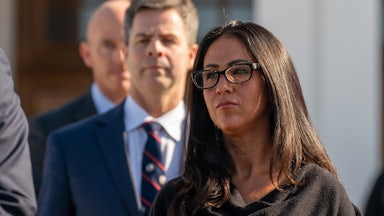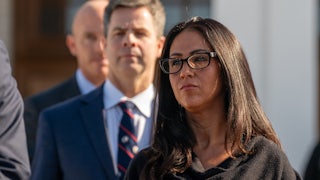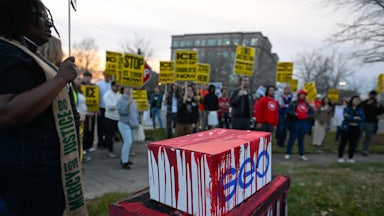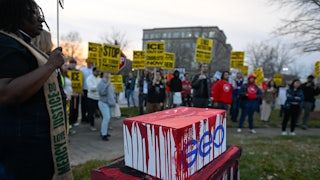Stephen Colbert announced on Thursday night that next May would mark not just the end of his run as host but the death of The Late Show itself, a CBS institution that has existed since 1993.
“I found out just last night,” Colbert told his audience. “Yeah, I share your feelings,” he continued as they booed. “It’s not just the end of our show, but it’s the end of The Late Show on CBS. I’m not being replaced. This is all just going away.”
What Colbert didn’t say was why CBS would suddenly kill off one of television’s most storied franchises. The network’s press release insisted this was “purely a financial decision” while defensively adding it was “not related in any way to the show’s performance, content or other matters happening at Paramount.” That second part reads like someone protesting way too much.
If you’re thinking that sounds like complete bullshit, you’re right.
Just days earlier, Colbert had openly mocked Paramount for paying Trump $16 million to settle what the company itself called a meritless lawsuit. “I believe this kind of complicated financial settlement with a sitting government official has a technical name in legal circles,” Colbert joked on Monday. “It’s Big Fat Bribe.” He even acknowledged reports that Skydance’s new ownership might “put pressure on late night host and frequent Trump critic Stephen Colbert.”
The real story starts with an $8 billion merger, a right-wing billionaire, and a president who just successfully shook down CBS for $16 million. The Late Show isn’t dying because people stopped watching late-night TV. It’s being murdered because Stephen Colbert spent the last decade being one of Trump’s most persistent critics on network television, and the billionaires about to take over CBS need Trump’s approval for their merger.
Let me explain how we got here.
To understand why The Late Show is really ending, you need to know about Larry Ellison. The Oracle founder is worth $180 billion, making him the fifth-richest person on earth. He’s also a Trump supporter.
Last year, Ellison invested $6 billion to help his son David’s company, Skydance Media, acquire Paramount in an $8 billion deal. That’s right: Larry Ellison is essentially buying CBS.
But here’s the thing about buying a major broadcast network: You need approval from the Federal Communications Commission to transfer the broadcast licenses. And guess who controls the FCC? Trump’s hand-picked chairman, Brendan Carr, who wears a gold pin of Trump’s face on his lapel and has made it clear he sees his job as doing the president’s bidding.
This is where things get really ugly. Last fall, Trump filed a ridiculous $20 billion lawsuit against CBS, claiming the network committed “election interference” by editing a 60 Minutes interview with Kamala Harris. The lawsuit was obviously frivolous. Paramount’s own lawyers said it was “completely without merit.”
So why did Paramount settle for $16 million? Because they needed Trump’s FCC to approve the Ellison merger. Democratic senators called it what it was: extortion. Oregon Senator Ron Wyden was even more blunt, posting that “Paramount just paid Trump a bribe for merger approval.”
If you want to know what CBS might look like under the Ellisons, consider who David Ellison has been courting. According to multiple reports, he’s been in talks to acquire The Free Press, the “anti-woke” media company founded by Bari Weiss after she left The New York Times.
Weiss, who started The Free Press in 2021 with her wife, Nellie Bowles, and sister Suzy, has built a publication that New York magazine described as wanting to “excoriate liberals but not fold fully into the MAGA wing.”
The talks between Ellison and Weiss reportedly happened at the Sun Valley conference, where media deals often get made. One option being floated, according to a Hollywood Reporter story, would have Weiss help direct “the editorial sensibilities of CBS News” without formally joining the management team.
This is the same CBS News that has already seen a wave of resignations over editorial independence. 60 Minutes showrunner Bill Owens quit earlier this year, saying he no longer had the ability “to make independent decisions based on what was right for 60 Minutes, right for the audience.” CBS News president Wendy McMahon followed soon after for similar reasons.
The Colbert cancellation is just the latest domino to fall. Since Trump’s election, CBS has been systematically abandoning any pretense of journalistic independence.
First came the lawsuit. Trump demanded CBS release the full transcript and raw footage of the Harris interview. The network initially refused, calling it an intrusion on First Amendment rights. But when FCC Chairman Carr opened a formal investigation and demanded the materials, CBS folded immediately.
Then came the $16 million settlement. According to The Washington Post, the breaking point came in May when CBS President George Cheeks called news division chief Wendy McMahon and suggested, “It’s probably time.” Two days later, McMahon announced her resignation.
The Post’s reporting makes clear what was happening: “The network of Edward R. Murrow, which stood against McCarthyism and once defined American broadcast journalism, was capitulating to White House pressure as its corporate owner sought approval for a lucrative merger.”
CBS staffers were reportedly “doleful” when the settlement was announced. At Paramount’s shareholders meeting, co-CEO George Cheeks tried to spin it as just business, saying companies “often settle litigation to avoid the high and somewhat unpredictable cost of legal defense.” But everyone knew what this really was. As one retired CBS executive told Variety, “If this is in the way, then $16 million is a rounding error in the greater scheme of the deal.”
Now Colbert is gone too. The host who called Trump a “Big Fat Bribe” payer on Monday was told his show was canceled by Thursday.
Rolling Stone’s Alan Sepinwall argues that late-night TV was already dying, killed by YouTube clips and fractured attention spans. There’s truth to that. But Colbert’s cancellation isn’t about ratings or changing media habits. It’s about silencing one of the few remaining voices on network television willing to consistently challenge Trump.
Think about what Colbert represented. Every weeknight, in front of millions of viewers, he delivered sharp political commentary that treated Trump not as a normal president but as the threat to democracy he represents. While other media outlets twisted themselves into pretzels trying to appear “balanced,” Colbert called bullshit. Night after night.
That’s why his final monologue about the settlement was so dangerous to CBS’s incoming overlords. Colbert didn’t just criticize the payment; he named it for what it was. He connected the dots between the money, the merger, and the pressure he might face. He essentially predicted his own cancellation on air.
“Some of the TV typers out there are blogging that once Skydance gets CBS, the new owner’s desire to please Trump could put pressure on late night host and frequent Trump critic Stephen Colbert,” he said Monday night. Then, with his trademark deflection: “But how are they going to put pressure on Stephen Colbert if they can’t find him?”
They found him. Three days later.
The message to everyone else in media is crystal clear: Criticize Trump at your own risk. Even if you work for a major network. Even if you host a successful show. Even if you’re Stephen Colbert.
With Colbert gone, who’s left to challenge Trump on network television? The landscape looks pretty bleak.
Jimmy Kimmel remains Trump’s most vocal critic, but ABC already folded once to Trump pressure, settling a defamation lawsuit with their own payment. How long before Disney decides Kimmel is more trouble than he’s worth?
Seth Meyers continues his “Closer Look” segments dissecting Trump’s policies, but NBC is owned by Comcast, which Trump has repeatedly threatened to investigate.
Jimmy Fallon? He already apologized for “humanizing” Trump by tousling his hair back in 2016. Jon Stewart is back at The Daily Show, but only once a week on Comedy Central (also owned by Paramount, so who knows how long that’ll last), not a major network.
The truth is, late-night TV was already dying. Viewership has been declining for years. Younger audiences get their comedy from TikTok and YouTube, not from guys in suits behind desks. But there was something valuable about having these voices on network television, reaching millions of Americans who might not seek out political content otherwise.
Colbert understood this. In his final weeks, he wasn’t just doing comedy; he was bearing witness. When Trump manufactured crises or pushed authoritarian policies, Colbert was there to say, “This isn’t normal.” Night after night, in homes across America.
Now that voice is being silenced. Not because viewers stopped watching, but because a right-wing billionaire needs regulatory approval and a vindictive president demands submission.
Think about where Stephen Colbert started. At Comedy Central, he played a character who parodied right-wing media manipulation. His whole schtick was pretending to be a Fox News–style propagandist who twisted facts, attacked critics, and defended power at all costs.
Twenty years later, he’s been silenced by actual media manipulation. Real billionaires wielding real power to protect their real financial interests.
The writers who created The Colbert Report couldn’t have scripted it better. Except this isn’t satire. It’s just what happens now when media companies need government approval for their deals.
We’ve entered an era where the quiet part gets said out loud; where the corruption happens in broad daylight. Trump calls the settlement what it is: a win for holding “Fake News media accountable.” Democratic senators call it extortion. CBS executives pretend it’s just business.
And Stephen Colbert? He gets 10 more months to make jokes before the lights go out for good.
The message couldn’t be clearer: Cross Trump, lose your platform. It doesn’t matter if you’re Stephen Colbert with a decade of success at CBS. It doesn’t matter if you’re hosting a beloved franchise that’s been on air for over 30 years.
When billionaires need favors from authoritarian presidents, you’re expendable.
This is how media freedom dies. Not with dramatic raids on newsrooms or journalists thrown in jail (though who knows what the rest of Trump’s second term will bring). It dies with mergers and acquisitions, with regulatory pressure and financial settlements, with billionaires who see news organizations as just another business asset to be leveraged.
The Ellisons aren’t unique. Jeff Bezos killed The Washington Post’s presidential endorsement and is currently skewing the Opinion section hard to the right. Elon Musk turned Twitter into his personal propaganda machine. Now Larry Ellison is buying CBS, and one of his first moves is silencing Trump’s loudest critic on network TV.
As one media expert told Variety, “The law doesn’t seem to matter. It feels a bit like the wheels are coming off.”
In his cancellation announcement, Colbert took time to thank “the 200 people who work here.” That wasn’t just politeness. Those are 200 real jobs that will vanish when The Late Show ends. Camera operators, writers, producers, musicians, makeup artists: all the people who make television happen.
They’re collateral damage in this billionaire power play. They didn’t criticize Trump. They didn’t call anyone’s settlement a “Big Fat Bribe.” They just showed up to work at a show that happened to be hosted by someone who refused to normalize autocracy.
This is the human cost of media capitulation. Not just the famous faces we see on screen, but hundreds of workers who thought they had stable careers at a successful show. Now they’ll be scrambling for work in an industry that’s already hemorrhaging jobs.
Meanwhile, Larry Ellison will still be worth $180 billion. David Ellison will still run Skydance. Trump will still be president. The powerful remain untouched while working people pay the price for their politics.
The Late Show With Stephen Colbert has 10 months left. Ten months of monologues and celebrity interviews and musical guests, all while everyone knows the show is already dead.
Will Colbert keep speaking truth to power, knowing it cost him his show? Or will he play it safe, stick to softer jokes, avoid the topics that might upset the new bosses? Either choice would be understandable. He’s already paid the price for his honesty.
As for CBS under the Ellisons, all signs point to a rightward shift. When you’re courting Bari Weiss to shape your news division’s “editorial sensibilities,” you’re not exactly committing to fearless journalism. Expect more “both sides” coverage, more platform for “anti-woke” voices, more deference to power.
The Late Show dies in May 2026. By then, the Ellisons will control CBS and network television will have one less voice willing to say the emperor has no clothes.
But here’s what they can’t kill: the knowledge that this happened. That a major television network canceled its most successful late-night show to appease a president. That billionaires bought a news organization and immediately silenced their critics. That this is what “free press” looks like when authoritarians and oligarchs make the rules.
Remember that when they tell you it was just about money. Remember that when they pretend this is normal. Remember Stephen Colbert, who looked at corruption and called it what it was, right up until they took his microphone away.
The show must go on, they say. But sometimes, the show just ends.
